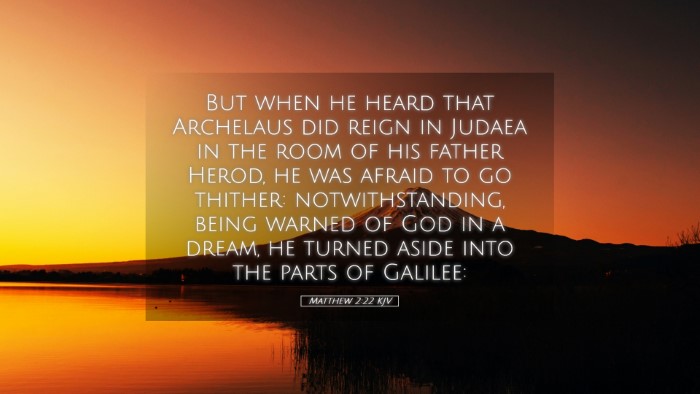Commentary on Matthew 2:22
In this verse, we encounter a crucial moment in the early narrative of Jesus' life. Matthew 2:22 states:
"But when he heard that Archelaus was reigning over Judea in the place of his father Herod, he was afraid to go there."
To understand the significance of this passage, we must delve into the historical and theological context provided by various commentators from the public domain.
Historical Context
Matthew 2:22 occurs shortly after the birth of Jesus and the flight of Joseph, Mary, and the child to Egypt due to Herod's decree to kill the infants in Bethlehem. Following Herod's death, they intended to return to Israel. However, Archelaus, who succeeded Herod, created a climate of fear due to his tyrannical reputation.
Insights from Matthew Henry
Matthew Henry emphasizes the providential hand of God in guiding Joseph and his family. He notes:
- Divine Guidance: God warned Joseph in a dream, indicating that the Lord is actively involved in the lives of His people, especially during perilous times.
- Fear and Wisdom: Joseph's fear of Archelaus demonstrates a prudent approach to leadership and parenting. He did not rely solely on the past promises of God but paid attention to the current realities of their situation.
- Human Authority: Henry underscores that the rulers of the world are instruments in God’s hands, whether for good or ill, and this reminds us of the sovereignty of God over earthly powers.
Insights from Albert Barnes
Barnes presents a detailed examination of the political landscape of Judea at this time:
- Reputation of Archelaus: Barnes notes that Archelaus was known for his cruelty, which established a daunting environment for Joseph and his family upon their return. This fear is notable as it reflects the historical animosities of the ruling class.
- God’s Sovereignty and Plans: Barnes argues that Joseph’s apprehension does not reflect a lack of faith, but rather an understanding of the times and God’s direction in navigating them.
- Importance of Dreams: He points out that God often communicates with His people through dreams, emphasizing their importance in guiding the faithful in times of distress.
Insights from Adam Clarke
Clarke provides additional theological reflections on the implications of Joseph’s fear:
- Nature of Fear: Clarke discusses how fear, in this context, can be protective and wise. Joseph’s caution may be interpreted as a gift of discernment.
- Role of the Holy Spirit: He mentions the influence of the Holy Spirit in providing wisdom to Joseph, mirroring how believers today are guided in their decisions.
- Moral Responsibility: Clarke also reflects that Joseph's actions illustrate moral responsibility. His decision reflects a deep concern for the safety and future of his family.
Theological Implications
Matthew 2:22 serves as a reminder to pastors, students, theologians, and biblical scholars of several theological principles:
- Divine Sovereignty: The overarching narrative highlights God's control over history and human authorities, reinforcing the belief that God’s providential care does not negate human experiences of fear and uncertainty.
- Wisdom in Decision-Making: Joseph’s wisdom derived from his fear instructs us on the importance of thoughtful discernment in leadership and familial responsibilities.
- Communicating with God: The text encourages prayer and vigilance. Just as Joseph received divine guidance through dreams, believers today are called to seek God's wisdom in prayer.
Conclusion
Matthew 2:22 is rich in insight and application for today’s readers. The verse transcends its immediate historical context, offering a timeless message about the ways God leads and protects His people. In studying this passage, we learn that true leadership is characterized by awareness of one’s surroundings, reliance on God’s guidance, and a deep commitment to the well-being of others.


